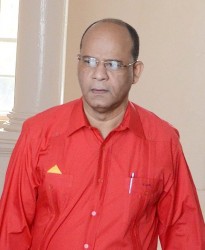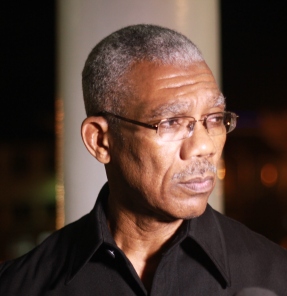The leaders of Guyana’s parliamentary opposition say they are willing to commit to working with government to find the best measures to deal with the country’s crime problems but only if current Home Affairs Minister Clement Rohee is out of office.
Leader of the Opposition and the leader of APNU David Granger, who describes the country’s crime rate as “past crisis point,” told Stabroek News that he is not willing to collaborate with Rohee, while AFC leader Khemraj Ramjattan is skeptical about the government’s willingness to take on board substantial recommendations.
The opposition had used their combined one-seat majority to pass a motion of no confidence against Rohee in the National Assembly last year, saying that since assuming the post he has failed to address the country’s crime situation.

“As leader of the opposition, I am willing to collaborate with the government but I will not collaborate with Rohee because it would be a waste of time,” Granger said.
“The government has been receiving reports and recommendations from the British, the Americans, the Canadians over the last 13 to 14 years and they have not implemented them because the ministers of Home Affairs have not had the interest or will to implement those schemes. But the schemes are there. What we need is the will,” he added, while repeatedly emphasising his willingness to work with government.
Ramjattan, meanwhile, said that if government calls for a meeting on brokering an accord tomorrow his party will be there. “Tomorrow, [if] they call, right away we will be there and we are going to make some substantial recommendations,” he said, while voicing his fear that the government will never call on the AFC or APNU because “the substantial recommendations that we are going to make is also going to get at some of them in that government and [those] in senior level, they being the ones that cover up for some of these narco dealers and smugglers and so on.”
Just last week the Trinidad media reported that Prime Minister Kamla Persad-Bissessar and Opposition Leader Dr Keith Rowley agreed to join forces to deal with the country’s crime scourge, including “untangling the hurdles” in the implementation of the death penalty.
“I am committed to working with the opposition…to fight what I see as a war, and this war is on crime and criminals,” Persad-Bissessar was quoted as saying.
Though there is a vast difference in population size between Guyana and Trinidad and Tobago, the crime situation in both countries have rated comparisons. Trinidad which has a large population size, records serious crimes every day, and Guyana, which has a much smaller population size, does as well.
The Trinidad media has reported that Persad-Bissessar and Rowley have been meeting regularly to discuss the steps that can to taken to deal with the situation. Among the issues agreed upon so far is the implementation of legislative measures to deal with gangs, witness protection and witness tampering.

Getting worse
Commenting on APNU’S view of the country’s crime situation, Granger told this newspaper that the coalition is “deeply concerned” about all types of crime. “We feel that the situation has been getting worse over the last six or seven years in particular and that is why at the end of July last year we brought a motion calling on the president to revoke the appointment of the Minister of Home Affairs,” he said.
He added that APNU has taken note of the situation affecting fishermen with piracy on the Corentyne Coast, banditry, the killings of both Brazilian and Guyanese nationals, disorderly crimes, trafficking in persons in the hinterland, and transnational crimes, particularly cocaine trafficking/narcotics trafficking and gun running.
“A lot of the guns coming into the country, particularly Taurus pistols, are likely to have been manufactured in Brazil… The gun running, particularly, has contributed to a very high rate of armed robberies. The current rate is about three per day”, he said adding that there is also the issues of domestic violence and school violence, a lot of which goes unreported.
“So we feel that the entire situation is past crisis point; that is why we feel we need a new minister to examine the so called ‘Citizens Security Programme’ that has been implemented… We do not feel that it is adequate,” he said.
According to Granger, APNU believes that there is need for the structural reform of the Guyana Police Force. “It has to be brought up to strength in terms of manpower and womanpower. It has to be brought up to strength, in terms of assets; it has to be given aircrafts; [and] it has to be given boats, All-Terrain Vehicles to allow it to police the country properly. In our view, the government has not provided the regular police force with the resources it needs to bring crime under control,” he stressed.
Granger also said that on the contrary, government has introduced certain measures such as the CSP, neighbourhood policing and community policing groups but he argued that such programmes cannot resolve “the type of crime that has been happening.”
He noted that government has come up with a dozen different schemes over the last 14 years but “they are not intended to solve the problems of criminal violence. It is not intended to solve the problem of piracy, banditry. So these schemes create the illusion that work is being done but in fact the police force is still structurally weak.
The policemen are not adequately-trained. They are not adequately-equipped, so nothing will come of the government’s efforts to deal with the security situation until there is change at the top. Somebody has to be appointed as Minister of Home Affairs who is capable of enforcing a serious anti-narcotics strategy. Now there is no anti-narcotics strategy and a serious reform plan. These things just don’t exist.”
A Mess
Meanwhile, Ramjattan said that if he had to put the state of the country’s crime situation into one word, he would describe it as a “mess.”
“…It is my view, based on what we see reported in the newspapers, because we are not getting the statistics from the Home Affairs Ministry, [this] obviously indicates that it is increasing and increasing in astronomical proportions. But what is worse is the fact that we are not getting anything concrete from the relevant authorities and, by that, I mean the Ministry of Home Affairs and the police force,” he explained.
He said that there is nothing to indicate that these two entities are confronting these increases with any measure of success. “That is what is making the whole perception that we are not in any command of the crime situation in Guyana,” he said.
Ramjattan cited the seeming increase in cocaine being smuggled out of the country in a variety of ways, saying that the general rule is that when one shipment is intercepted ten more go through.
He said that there is “a lot of narco criminals out there [that] are amassing vast fortunes and in that process too they are going to utilise those fortunes to corrupt policemen, to corrupt customs officers and also forestry officers… we are having at the end of it all a very corrupt society that is being bred as a result of successes being made by many criminals and to that extent it is not good at all.”
Ramjattan added that at the cultural level, “the young people are fooled into believing that there is a future in doing these activities because people are getting off and getting wealthy and building the biggest of buildings in Georgetown…. buying the Mercedes and the big fancy Hummer and living the beautiful lifestyle… and that is a terrible thing to inspire our young minds and it is going to be dangerous for us all.”





